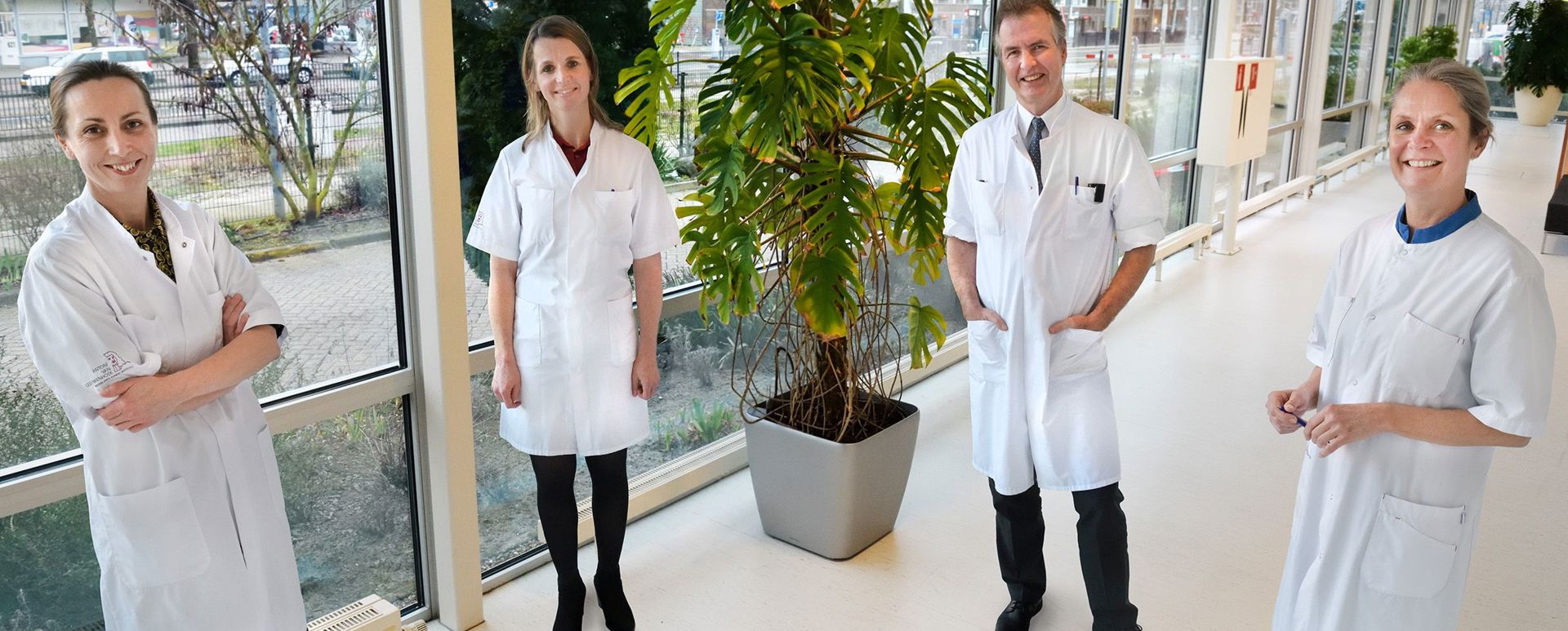Organ-sparing rectum clinic
Over the past years, we have increased our understanding of organ-sparing treatment for patients with rectal cancer: treatment in which the rectum itself is preserved. The Netherlands Cancer Institute has set up a special clinic in which patients, specialists, and general practitioners can find answers to all their questions about organ-sparing treatment for rectal cancer.
When is organ-sparing treatment an option?
Standard treatment for rectal cancer (rectal carcinoma) consists of the surgical removal of most of the rectum (total mesorectal excision). Surgery is often preceded by radiotherapy, sometimes in combination with chemotherapy (chemoradiation) or chemotherapy alone, depending on the stage of the illness. This treatment affects the pelvic organs and can cause issues with the bowels, urination, or sexuality, affecting the patient's quality of life. Over the past years, the need and possibilities for organ-sparing treatment for rectal cancer have been increasing.
Quality of life
Research has shown that the patient's quality of life after organ-sparing treatment is much higher than after (chemo)radiation or major rectal surgery. We conduct research to find out which patients are eligible for organ-sparing treatment with the highest chances of being able to preserve the rectum and quality of life.
When is organ-sparing treatment an option?
When the tumor is gone
Rectal tumors have a (small) chance of disappearing after radiation pretreatment: better known as a complete response. If a tumor seems to have disappeared completely, we can consider opting out of surgery in favor of a "watch and wait" approach. This means that you will have to come in for regular screenings using endoscopy and MRI.
When the tumor has shrunk significantly
If the tumor has shrunk significantly after pretreatment with (chemo)radiation but some tissue remains, we might be able to consider organ-sparing treatment by means of additional local treatment as an alternative for rectal surgery (total mesorectal excision; TME). Some examples of local treatment are internal radiation (contact therapy or brachytherapy) or local surgical tumor removal (Transanal Minimally Invasive Surgery; TAMIS or Transanal endoscopic microsurgery; TEM). Once the tumor is gone, we will monitor the area intensively by following the "watch and wait" approach.
Despite all these treatment options, a part of the rectal cancer patient group will still need to undergo rectal surgery in order to recover.
Who is eligible for the organ-sparing rectal clinic?
- Patients with a primary diagnosis of rectal cancer:
- Patients with a clear wish to spare the organ at the moment of diagnosis.
- Older, more vulnerable patients who cannot or should not undergo TME surgery.
- Patients after pretreatment with (chemo)radiotherapy:
- Patients with a good or complete response during response evaluation who express a clear wish to preserve the organ. and who are eligible for evaluation of organ-sparing treatment as the next step in their treatment or screening.
What can the organ-sparing rectal clinic do for you?
You can come to us for:
- Any questions regarding organ-sparing treatment for rectal cancer.
- Treatment advice. Our team will evaluate all previous examinations, when possible in one day. Whenever possible, you will receive your treatment at the referring hospital near you.
- A second opinion.
- Trial participation. We investigate which patients can safely undergo organ-sparing treatment with the greatest chance of preserving the rectum and quality of life.

What does a day at the organ-sparing rectal clinic look like?
- After your registration or referral, you will receive a confirmation email and an invitation for an appointment at the clinic containing a link to a website with more information about your day. We try to get as much done on the same day as possible.
- On that day, you will have:
- An intake consultation with an expert specialist.
- A rectal endoscopy by a gastroenterologist (if necessary).
- A multidisciplinary team meeting, including the reevaluation of previous imaging, like MRI or CT scans.
- A consultation about your results with a team of experts; they can give you treatment advice.
- If necessary, an additional consultation with a researcher for an explanation of your trial participation.
- A consultation with a clinical nurse specialist, if you wish to receive your treatment at the NKI.
- We will immediately share your results with your referrer.
Our team of specialists
Our multidisciplinary team of specialists has lots of experience and expertise in the treatment of rectal cancer.
Radiation oncologists
Internists
Gastroenterologists
Radiologists
Pathologists
Clinical nurse specialists GI surgery
How to make an appointment?
To make an appointment, all you need is a referral from your general physician or specialist.
Referral from your general practitioner or specialist
General practitioners or specialists from other hospitals can come to us to request a second opinion or referral. When possible, you can still receive your treatment at the referring hospital.
Advisory consultation for referrers
General practitioners or specialists from other hospitals can come to us with questions about specific cases or general questions about organ-sparing treatment for rectal carcinoma. Please email rectumpoli@nki.nl or call +31 (0)20-5129111.
Changing your appointment
To change your appointment, please contact the clinic's Planning department. You can reach them on weekdays at the Netherlands Cancer Institute general phone number +31 (0)20-5129111.
Trials
The Netherlands Cancer Institute combines its hospital care with groundbreaking cancer research. We investigate which patients can safely undergo organ-sparing treatment with the greatest chance of preserving the rectum and quality of life. We would like to highlight several of these trials:
Important notice
Not all patients are eligible for trial participation. Only a select number of patients with rectal cancer can participate in a trial, and we use strict selection criteria to determine who can and who cannot participate. There is no free choice in trial participation.
During your visit to the clinic, we will discuss whether you are eligible for a trial. After your consultation, you can read all information about the trial and decide whether you would like to participate.
Click here for more information about trial participation.
 nl
nl
 Nederlands
Nederlands























